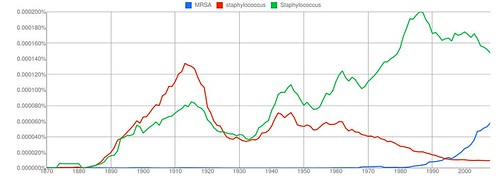So Google has released this Ngram thingee that searches for words in all of the archived Google stuff. So I decided to look for the words "MRSA", "staphylococcus", and "Staphylococcus." Here's what I found:

You'll note that both staphylococcus and Staphylococcus surge around the same time as the influenza pandemic of 1918. What's odd though is that if we drill into the years 1910-1920, the highest use of both words is around 1913, although it doesn't decrease much until after 1920. Presumably, bloodstream infections (sepsis) from WWI, followed by the influenza pandemic--in which secondary staphylococcal and streptococcal infections played a huge role in mortality--made these widely discussed terms. What's interesting too, is that the use of staphylococcus as a general pronoun seems to have declined even as the use of Staphylococcus has increased ("staphylococci also peaked in the 60s and then decreased. Damn hippies! Or something).
Regarding MRSA, as you might expect, as evolved in the late 1960s and spread worldwide, mentions of it became more and more common. An odd thing about "MRSA" is that in the 1800s, especially the first half, MRSA was also a title in England, although I can't find out what it means (Google is completely overwhelmed by the modern MRSA, and apparently it is a title no longer in use).

In answer to your post
MRSA = Member of the Royal Society of Arts.
A happier meaning!
The Royal Society for the encouragement of Arts, Manufactures and Commerce began about 250 years ago, and still exists:-
http://www.thersa.org/about-us
Haha!! Didn't know google could do that.
http://lokiscience.blogspot.com/2010/12/rogue-agent-nor-threat-to-milli…